NSF-sponsored Workshop on Digitally-Mediated Team Learning
DMTL 2019
- URL: https://www.digital-learning-teams.com/
- Event Date: 2019-03-31 ~ 2019-04-02
- Abstract Submission Date: 2018-12-24
- Submission Date: 2019-01-15
- Location: Orlando, United States of America
CALL FOR PARTICIPATION
National Science Foundation (NSF) Sponsored Workshop
*** 50 TRAVEL STIPENDS are available to U.S. citizens/residents only: please see website to apply ***
Synthesis and Design Workshop on
Digitally-Mediated Team Learning
March 31 – April 2, 2019
Orlando, FL
Important Dates
* December 15, 2018: Early Stipend Consideration - Position Abstract and Expertise Profile submission for early consideration of a travel stipend.
* January 31, 2019: Stipend Request Deadline - Position Abstract and Expertise Profile submission deadline to receive consideration for a travel stipend.
* February 15, 2019: Non-Stipend and Poster Commitment Deadline - Expertise Profile submission deadline for those who are not requesting a travel stipend. Poster presentation request deadline.
Overview
This workshop aims to identify and prioritize research directions by examining existing and next-generation approaches to DMTL for selected foci within research on computer-supported collaborative learning. During the two-and-a-half day workshop, participants will be afforded opportunities to participate in a poster session, keynote, panel session, technical breakout sessions, and action committees. Workshop participants contribute to a White Paper defining 1/3/5+ year research plans requested by NSF.
Participation & Track Organization
This workshop is open to all researchers, educators, and industry developers advancing transformative pedagogical approaches for technology-enhanced team learning within STEM disciplines. In addition to the common activities, the workshop will operate four concurrent tracks:
1) Facilitating Team Learning in Real-time via Online Technologies:
* Online instructional environments for engaging, observing, and assessing collaborative learning
* IDT for STEM design and problem-solving teams in-situ
* Student-Facing and Instructor-Facing support
3) Supporting Digital Teams using Active Pedagogical Strategies:
* Underpinning team activity in STEM classroom settings via cognitive science
* Exploring andragogical and pedagogical methods and strategies
* Intrinsic/Extrinsic Incentivization leading to actionable lesson plans.
2) Collaborative Learning via Analytics:
* Data-mining of assessments for automated optimization of team composition
* Collecting and leveraging of real-time observations of participation and dynamically identifying learners’ needs
* Back-end reporting of learning outcomes
4) Empowering Equitable Participation in DMTL
* Fostering collaborative digital learning approaches that broaden participation among underserved/underrepresented populations
* Investigating the role of Socially-Agnostic participation in team learning environments
Workshop Website: http://digital-learning-teams.com
National Science Foundation (NSF) Sponsored Workshop
*** 50 TRAVEL STIPENDS are available to U.S. citizens/residents only: please see website to apply ***
Synthesis and Design Workshop on
Digitally-Mediated Team Learning
March 31 – April 2, 2019
Orlando, FL
Important Dates
* December 15, 2018: Early Stipend Consideration - Position Abstract and Expertise Profile submission for early consideration of a travel stipend.
* January 31, 2019: Stipend Request Deadline - Position Abstract and Expertise Profile submission deadline to receive consideration for a travel stipend.
* February 15, 2019: Non-Stipend and Poster Commitment Deadline - Expertise Profile submission deadline for those who are not requesting a travel stipend. Poster presentation request deadline.
Overview
This workshop aims to identify and prioritize research directions by examining existing and next-generation approaches to DMTL for selected foci within research on computer-supported collaborative learning. During the two-and-a-half day workshop, participants will be afforded opportunities to participate in a poster session, keynote, panel session, technical breakout sessions, and action committees. Workshop participants contribute to a White Paper defining 1/3/5+ year research plans requested by NSF.
Participation & Track Organization
This workshop is open to all researchers, educators, and industry developers advancing transformative pedagogical approaches for technology-enhanced team learning within STEM disciplines. In addition to the common activities, the workshop will operate four concurrent tracks:
1) Facilitating Team Learning in Real-time via Online Technologies:
* Online instructional environments for engaging, observing, and assessing collaborative learning
* IDT for STEM design and problem-solving teams in-situ
* Student-Facing and Instructor-Facing support
3) Supporting Digital Teams using Active Pedagogical Strategies:
* Underpinning team activity in STEM classroom settings via cognitive science
* Exploring andragogical and pedagogical methods and strategies
* Intrinsic/Extrinsic Incentivization leading to actionable lesson plans.
2) Collaborative Learning via Analytics:
* Data-mining of assessments for automated optimization of team composition
* Collecting and leveraging of real-time observations of participation and dynamically identifying learners’ needs
* Back-end reporting of learning outcomes
4) Empowering Equitable Participation in DMTL
* Fostering collaborative digital learning approaches that broaden participation among underserved/underrepresented populations
* Investigating the role of Socially-Agnostic participation in team learning environments
Workshop Website: http://digital-learning-teams.com













